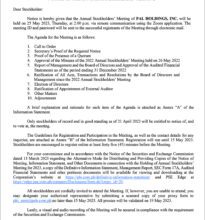A game changer in attracting foreign investments

The Philippines has long languished behind its Southeast Asian neighbors in attracting foreign investments. Many factors have been cited for this including the state of our infrastructure and the relatively high costs of pow-er across the archipelago. But the one fundamental thing that lies underneath it all is the restrictiveness of the economic provisions of the primordial law of the land. Compared to its Southeast Asian counterparts, the Philippines has the most restrictive provisions regarding foreign investment and businesses in its Constitution.
The 1987 Constitution effectively limits the foreign ownership of companies to 40% to ensure that Filipinos hold a majority stake in them. At the time of the constitutional deliberations, this appeared to be the sound, logical, and patriotic thing to do. Only Filipinos must be in control of businesses operating in the Philippines. This is our country, after all, and we refused what could be seen as control by forces driven by interests outside of the Filipinos’ common good.
As the decades passed and the global economy opened up, however, we saw how such provisions clipped our economic wings, while we watched other similarly situated countries realize their potential with the help of foreign capital. Foreign investments, after all, are key to many things: they bring expertise and know-how, cause the improvement of infrastructure, create jobs for locals translating into higher disposable income, and provide opportunities for economic activity and upward mobility.
This, too, creates a virtuous cycle: the more Filipinos are exposed to industry, the better they get at their jobs and the more vibrant the economy becomes, the better the infrastructure gets, and the more attractive the Phil-ippines becomes to investors.
Unfortunately, in the past, any moves to change the Constitution were met with skepticism by many policy leaders, believing this to be a political maneuver to enable some families to perpetuate themselves in power. Make no mistake about it: at-tempts at Charter Change are not new. They have been tried, in varying degrees, by previous administrations, whatever their real intentions were.
This time around, Filipinos appear to be better at making the distinction between effecting sweeping, licentious Charter Change, per se, and changing its economic provisions.
A Pulse Asia survey commissioned by the Stratbase ADR Institute and conducted last month revealed that 37% of Filipinos agreed that fostering a more open economy — one that is friendly to foreign investors — would be the optimal strategy to boost the country’s economic growth and development.
Respondents to this same survey highlighted significant factors hindering foreign investments in the Philippines. Among these: complicated regulations (56%), restrictive foreign ownership rules (55%), and public sector cor-ruption (46%).
The removal of restrictions against foreign investments in the Constitution, the respondents believe, will yield benefits for the people. Six in 10 believe that this will lead to an increase in high-quality jobs with better salaries and benefits.
They also think companies will be able to provide better service to their stakeholders because of increased efficiency and quality, driven by competition. In fact, half the respondents anticipate a decrease in prices of goods and services. Ultimately, then, the higher number of players in any given industry would result in better deals and more options for Filipino consumers.
Such results show that Filipinos are now more optimistic about the benefits of lifting economic restrictions.
For some time now, the Stratbase ADR Institute has articulated its support for investment-led growth. Through investments, businesses can create more and better job opportunities and establish a solid foundation for sus-tained economic growth. By doing so, the Philippines enhances economic security, reduces external dependencies, and strengthens resilience against global uncertainties.
Thus, a crucial step would be to address the barriers to the entry of foreign investments by changing the legal framework to complement the Executive’s efforts to go to different countries obtaining investment pledges.
Collaboration is also crucial. The private sector is willing and able to help, as it has demonstrated countless times. It plays a critical role in creating more quality jobs for the Filipino people. And, indeed, the people acknowledge this. In a September 2023 survey commissioned by the Institute, 70% of Filipinos see the private sector as key to achieving economic security. The public perceives the private sector as able to offer affordable goods and services while expanding job opportunities and livelihood activities.
But it must be given the chance to perform this role to the fullest. The government must be consistent with its moves to build an environment that is conducive for businesses. Ease of doing business must be a priority, and while there have been early steps to do this — shortening the steps in registration, for instance, or requiring fewer signatories to permits and licenses — streamlining bureaucratic processes should be implemented across all local government units around the country.
There is a trend among developed countries to derisk and decouple given the numerous uncertainties in the global geopolitical and geoeconomic situation. The Philippines should take advantage of this trend by asserting its attractiveness as an investment destination. We should not allow ourselves to be left behind. We must reap the benefits of a globalized economy while harnessing the competitive advantage of our people and our resources. Ultimately, this will translate to a better life for all — and what could be more patriotic than that?
Victor Andres C. Manhit is the president of the Stratbase ADR Institute.




